You can create an effective mosquito repellent using white vinegar mixed with water at a 25% concentration, which disrupts mosquitoes’ olfactory systems through its acetic acid content. Mix three parts water with one part white vinegar and spray it on your skin or around areas where mosquitoes gather. While apple cider vinegar works too, it’s less potent than white vinegar and may attract mosquitoes at lower concentrations. The complete guide below reveals advanced formulations and application techniques.
The Science Behind Vinegar as Mosquito Repellent
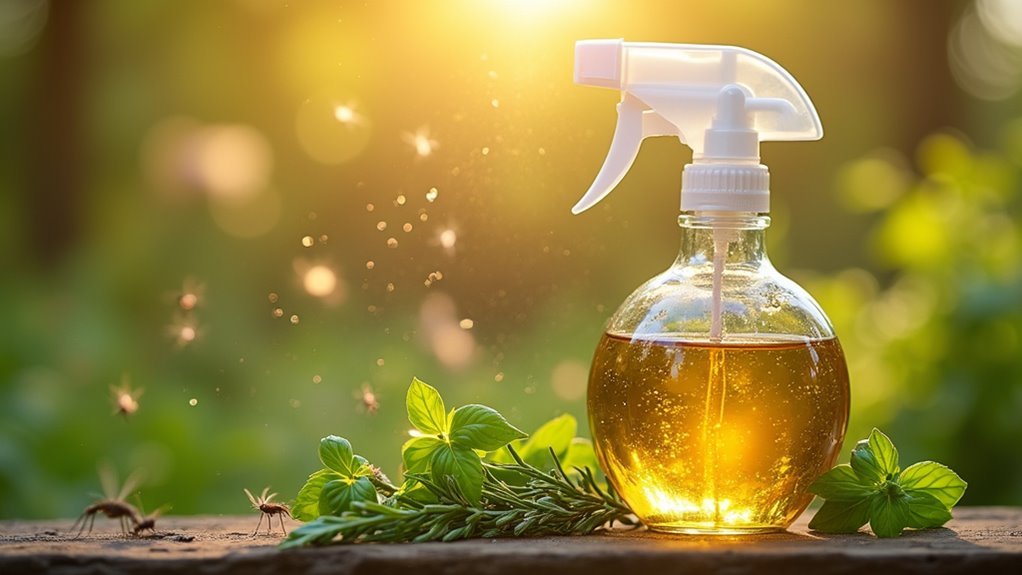
While many commercial mosquito repellents rely on synthetic chemicals, vinegar offers a natural alternative that works by overwhelming mosquitoes’ sensitive olfactory systems.
When you apply vinegar as a repellent, its overpowering scent disrupts mosquitoes’ ability to locate landing surfaces effectively. The acetic acid in vinegar creates an environment that mosquitoes actively avoid through their taste receptors, preventing them from biting treated areas.
High concentrations of vinegar, especially wood vinegar, can achieve up to 100% repellency rates against mosquitoes. Additionally, vinegar provides microbial control benefits by killing mosquito larvae in standing water, helping reduce overall populations.
However, you’ll need to use proper concentrations since lower amounts of apple cider vinegar might actually attract mosquitoes rather than repel them.
Different Types of Vinegar for Mosquito Control
Not all vinegars deliver the same mosquito-repelling power, and understanding their unique properties will help you choose the most effective option for your situation.
White distilled vinegar stands out with its 2.5 pH level, creating strong acidity that overwhelms mosquitoes’ olfactory senses.
Apple cider vinegar presents a dual nature – it’ll attract mosquitoes at low concentrations but repels them effectively at 5% concentration, achieving 39.6% repellency.
Wood vinegar proves most potent among different types of vinegar for mosquito control, delivering up to 100% repellency at 80% concentration.
Each vinegar type offers distinct advantages depending on your specific needs, whether you’re targeting adult mosquitoes or disrupting larvae in standing water through strategic concentration management.
How to Make Basic Vinegar Mosquito Spray
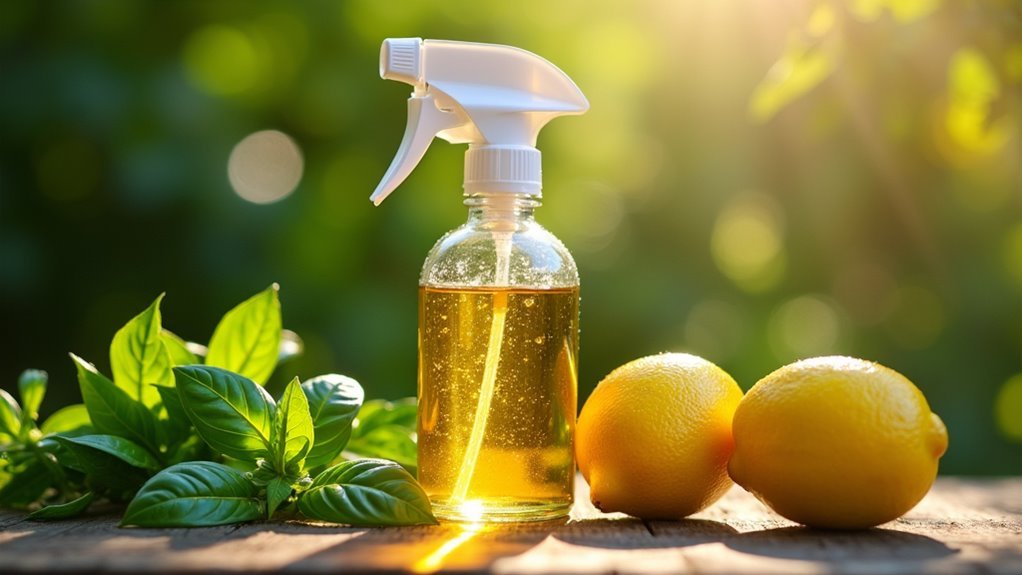
Now that you understand which vinegar types work best, you can create your own effective mosquito spray with just a few simple ingredients.
This homemade mosquito repellent uses vinegar as a mosquito deterrent by overwhelming their olfactory senses.
Here’s how to make your basic vinegar spray:
- Mix the solution – Combine three parts water with one part white vinegar in a spray bottle for a 25% concentration.
- Add soap (optional) – Include a few drops of dish soap to improve surface adhesion and boost effectiveness.
- Apply strategically – Spray in areas where mosquitoes congregate or directly on skin for outdoor protection.
Remember that while this natural ingredients mixture works as an effective mosquito deterrent, it won’t kill adult mosquitoes.
Regular reapplication is necessary, especially in damp environments.
Creating Effective Vinegar Mosquito Traps
Beyond surface spraying, vinegar traps offer a more targeted approach that actually captures mosquitoes rather than simply repelling them.
Creating effective vinegar traps starts with mixing one part dish soap with three parts apple cider vinegar in a plastic bottle. The vinegar’s strong scent will attract mosquitoes, while the soap breaks surface tension to trap them upon contact.
Cut the bottle’s top and invert it as a funnel—this allows mosquitoes easy entry but difficult escape. Hang your traps in elevated areas to maximize odor dispersion and reach wider areas.
You’ll need to refresh the mixture regularly and relocate traps to different spots for ideal results against mosquito populations. This method actively reduces their numbers rather than just deterring them.
Enhanced Vinegar Repellent With Essential Oils
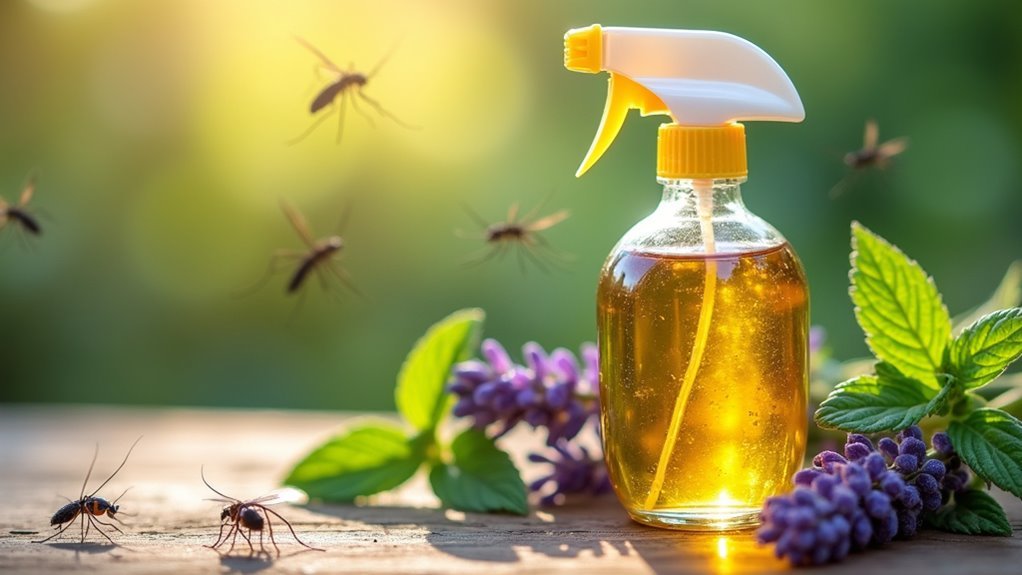
While basic vinegar solutions provide decent mosquito deterrence, combining vinegar with essential oils creates a markedly more powerful repellent that tackles mosquitoes on multiple fronts.
These DIY repellents enhance vinegar’s natural acidity with oils that mask the scents attracting mosquitoes to you.
For an effective indoor spray that’ll keep mosquitoes away:
- Mix three parts water with one part white or apple cider vinegar
- Add several drops of eucalyptus, lavender, or citronella essential oil
- Shake well before each application
The vinegar disrupts mosquitoes’ olfactory senses while essential oils provide additional deterrence and pleasant human-friendly scents.
You’ll need to reapply this mosquito repellent frequently, especially in humid conditions, to maintain peak effectiveness against persistent mosquitoes.
Application Methods for Maximum Protection
Since mosquitoes adapt quickly to deterrents, you’ll need strategic application methods to maximize your vinegar repellent’s protective power. The key lies in understanding where and how to deploy your solution effectively.
| Location | Vinegar Solution | Application Method |
|---|---|---|
| Indoor surfaces | 3 parts water + 1 part white vinegar | Spray directly on windowsills, doorframes |
| Outdoor areas | 3 parts water + 1 part apple cider vinegar | Mist around patios, gardens, standing water |
| Personal protection | Direct vinegar application | Apply sparingly to exposed skin |
Reapply your mosquito repellent every 2-3 hours, especially in humid conditions where the scent dissipates faster. Focus on entry points like doors and windows where mosquitoes typically infiltrate. These common household items become powerful allies when applied strategically rather than randomly sprayed around your space.
Limitations and Safety Considerations
Although vinegar offers a natural alternative to chemical repellents, it comes with significant limitations that you should understand before relying on it as your primary mosquito defense.
While vinegar provides a chemical-free mosquito solution, its inconsistent effectiveness and short protection period make it an unreliable standalone defense method.
This mosquito repellent method has several safety considerations that require careful attention:
- Effectiveness varies dramatically – While high concentrations can repel mosquitoes, lower concentrations may actually attract them, and protection only lasts 1-2 hours compared to commercial repellents’ 6-7 hour duration.
- Surface damage potential – Overuse can corrode surfaces and create unpleasant odors throughout your living spaces.
- Limited pest control scope – Vinegar kills adult mosquitoes on contact but proves ineffective against eggs and larvae, requiring additional methods for thorough control.
Exercise caution when applying vinegar near plants, as its acidity can damage certain vegetation and compromise your garden’s health.
Comparing Homemade Vs Commercial Repellents
When you’re deciding between homemade vinegar repellents and commercial products, you’ll find significant differences in how long they protect you and what ingredients they contain.
Commercial repellents typically last 6-7 hours while DIY options provide only about 2 hours of protection due to the quick evaporation of essential oils.
You’ll also want to weigh the cost savings of making your own repellent versus the convenience and proven effectiveness of store-bought alternatives.
Effectiveness Duration Comparison
The clock starts ticking the moment you apply any mosquito repellent, but homemade vinegar solutions and commercial products operate on vastly different timelines.
When conducting an effectiveness duration comparison, you’ll find significant gaps between these options. Your homemade vinegar mosquito repellent typically provides only 2 hours of protection, while commercial repellents deliver 6-7 hours of reliable coverage.
Essential oils in DIY formulations evaporate quickly, diminishing their effectiveness rapidly.
Here’s what determines protection duration:
- Active ingredient concentration – Commercial products contain EPA-registered compounds at peak levels
- Formulation stability – Professional products resist evaporation better than homemade mixtures
- Testing standards – Commercial repellents undergo rigorous evaluation for sustained effectiveness
For reliable protection, especially in disease-prone areas, you’ll want EPA-registered products over vinegar-based alternatives.
Safety and Ingredients
While effectiveness matters, safety considerations reveal even starker differences between homemade vinegar repellents and commercial alternatives.
When you create DIY solutions, you’re working with unregulated ingredients that haven’t undergone rigorous testing. Essential oils in homemade mixtures can cause skin irritation or allergic reactions because their quality and concentration vary dramatically.
Commercial repellents contain proven active ingredients like DEET or picaridin that’ve been scientifically evaluated for safety and effectiveness. These EPA-registered products maintain consistent formulations, reducing your risk of adverse reactions.
You’ll also get reliable protection that experts recommend, especially in high-risk areas.
Your homemade vinegar blend might seem safer, but without proper testing and standardization, you’re fundamentally experimenting on yourself.
Commercial products eliminate this guesswork through controlled manufacturing processes.
Cost and Convenience
Beyond safety concerns, your wallet and daily routine play major roles in choosing between homemade vinegar repellents and store-bought options.
Creating your own natural mosquito repellent using white vinegar offers considerable cost savings, utilizing common household ingredients at a fraction of commercial prices. However, convenience becomes a trade-off you’ll need to evaluate.
DIY Mosquito Traps and vinegar-based repellents present these key considerations:
- Cost advantage – Homemade solutions cost considerably less than EPA-approved commercial products
- Shorter protection window – DIY repellents typically last 2 hours versus 6-7 hours for commercial options
- Frequent reapplication required – You’ll need to reapply homemade versions more often throughout the day
While budget-friendly, homemade white vinegar repellents demand more time and effort for preparation and maintenance.
Frequently Asked Questions
Will Vinegar Keep Mosquitoes Away?
You’ll find that vinegar can effectively repel mosquitoes when you use higher concentrations. Mix three parts water with one part white vinegar and spray it around your indoor areas for best results.
What Is the Most Effective Homemade Mosquito Repellent?
You’ll find apple cider vinegar mixed with eucalyptus or citronella essential oils creates the most effective homemade mosquito repellent. Combine three parts water with one part vinegar, then add essential oils for enhanced protection.
Does Anything Actually Work to Repel Mosquitoes?
Yes, several methods actually work to repel mosquitoes. You’ll find DEET-based repellents most effective, followed by picaridin and oil of lemon eucalyptus. High-concentration vinegar, fans, and eliminating standing water also provide real protection.
What Can I Put on My Skin to Keep Mosquitoes From Biting Me?
You can apply DEET-based repellents, picaridin, or natural alternatives like citronella oil directly to your skin. These create barriers mosquitoes avoid. Reapply every few hours for continued protection.
In Summary
You’ve learned how vinegar can effectively repel mosquitoes through its acidic properties and strong scent. While it won’t match DEET’s performance, vinegar offers a natural, budget-friendly alternative that’s safer for your family. You’ll get better results by combining different vinegar types with essential oils and applying them strategically. Remember to reapply frequently and use multiple methods together. For serious mosquito problems, you’ll still need commercial repellents, but vinegar solutions work well for everyday protection.

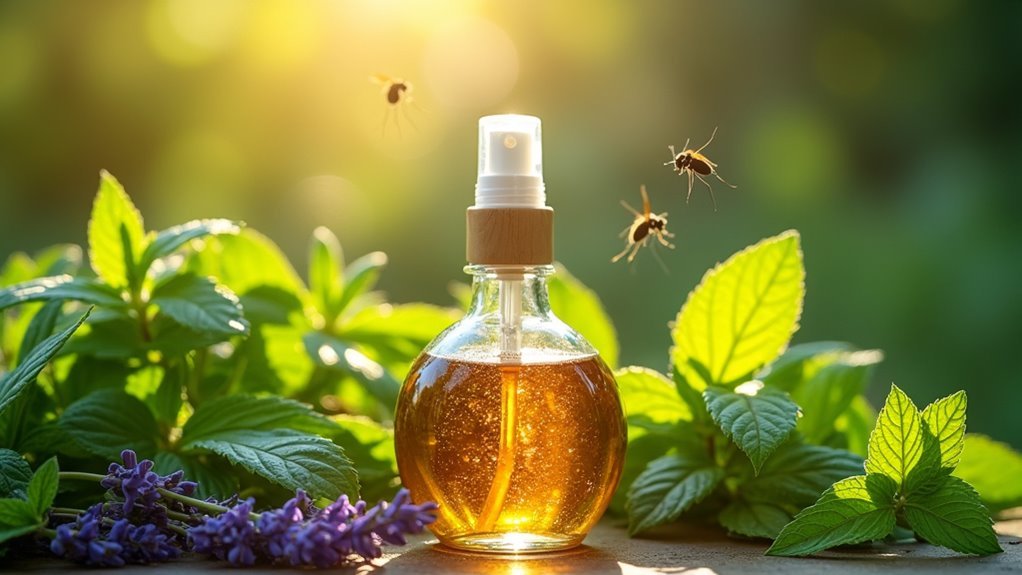
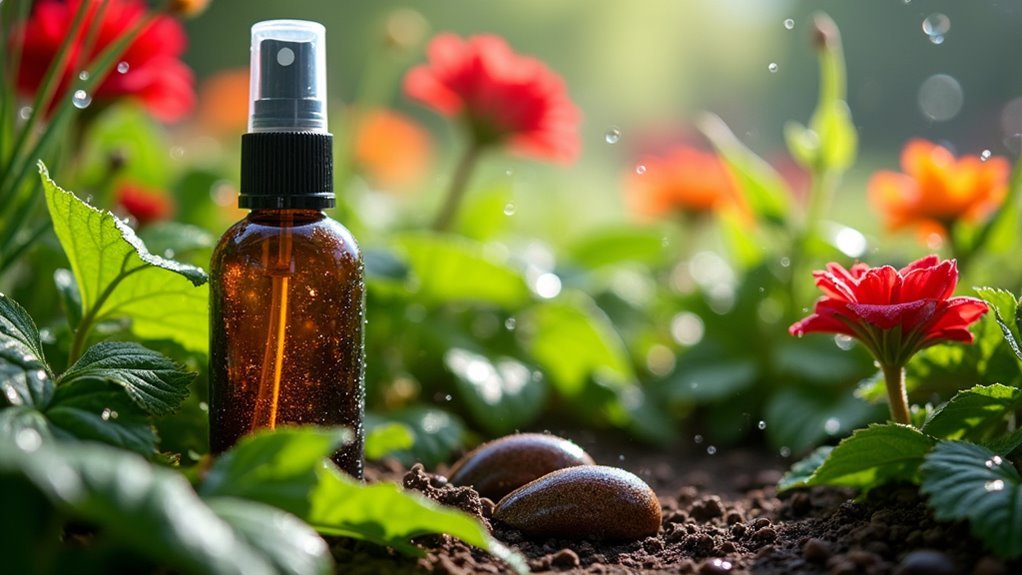
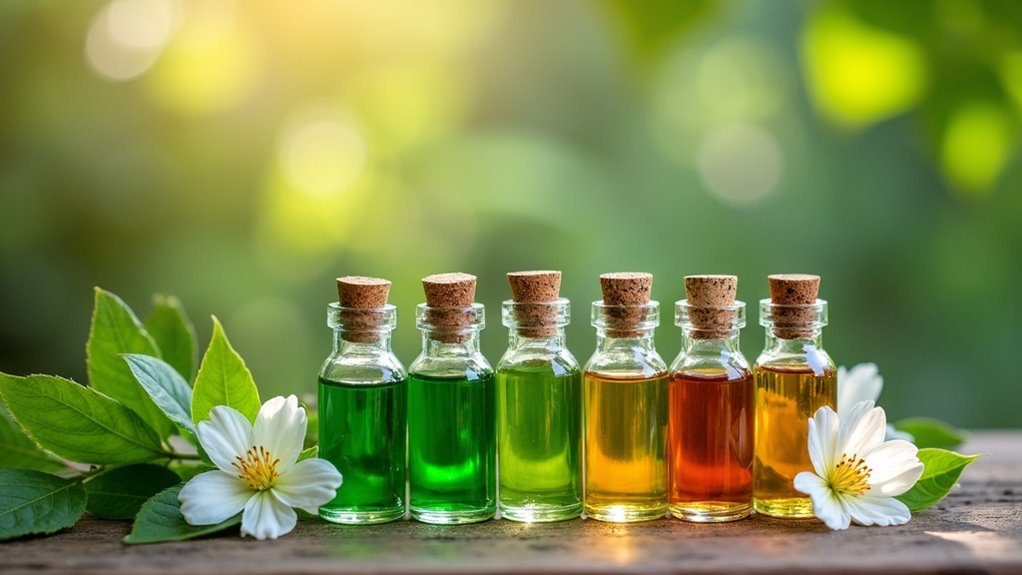
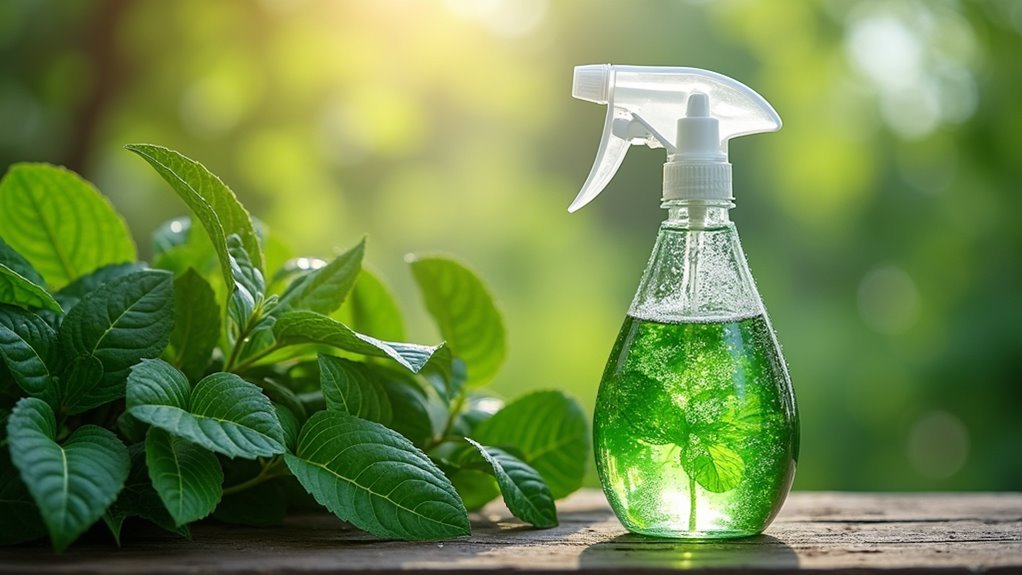
Leave a Reply